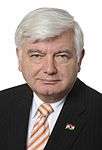1994 Hungarian parliamentary election
Parliamentary elections were held in Hungary on 8 May 1994, with a second round of voting in 174 of the 176 single member constituencies on 29 May.[1][2] They resulted in the return to power of the Hungarian Socialist Party, the former Communist party, under the leadership of Gyula Horn, who became Prime Minister. The Socialists achieved a remarkable revival, winning an overall majority of 209 seats out of 386, up from 33 in 1990. At the time, it was the most seats that a Hungarian party had ever won in a free election.
| |||||||||||||||||||||||||||||||||||||||||||||||||||||||||||||||||||||||||||||
All 386 seats in the National Assembly 194 seats needed for a majority | |||||||||||||||||||||||||||||||||||||||||||||||||||||||||||||||||||||||||||||
|---|---|---|---|---|---|---|---|---|---|---|---|---|---|---|---|---|---|---|---|---|---|---|---|---|---|---|---|---|---|---|---|---|---|---|---|---|---|---|---|---|---|---|---|---|---|---|---|---|---|---|---|---|---|---|---|---|---|---|---|---|---|---|---|---|---|---|---|---|---|---|---|---|---|---|---|---|---|
| Turnout | 68.9% | ||||||||||||||||||||||||||||||||||||||||||||||||||||||||||||||||||||||||||||
| |||||||||||||||||||||||||||||||||||||||||||||||||||||||||||||||||||||||||||||
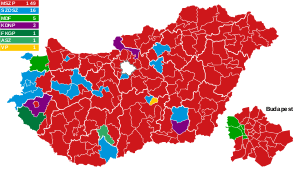 Results of the election in all 176 single-member constituencies | |||||||||||||||||||||||||||||||||||||||||||||||||||||||||||||||||||||||||||||
| |||||||||||||||||||||||||||||||||||||||||||||||||||||||||||||||||||||||||||||
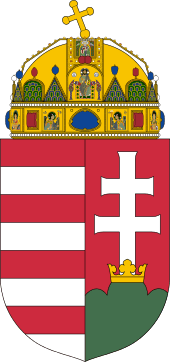 |
|---|
| This article is part of a series on the politics and government of Hungary |
|
Executive
|
|
Parliament |
The governing Hungarian Democratic Forum was severely defeated, falling from 165 seats to 38 for third place. It was also a disappointment for the principal opposition party of the previous parliament, the Alliance of Free Democrats, which failed to capitalize on the government's unpopularity and lost seats. Poor economic performance, apparent government incompetence and a certain nostalgia for the social security of the communist era appear to be the main reasons for the result, together with significant reform of the Socialists' policies, with commitment to the expansion for the market economy and continued compensation for the victims of communism.
While the Socialists had enough seats to govern alone, Horn decided to form a coalition with the Free Democrats, giving him a two-thirds majority. This was partly to assuage public concerns inside and outside Hungary over an ex-Communist party with an absolute majority, and partly to get his reform package past his own party's left wing.
Results
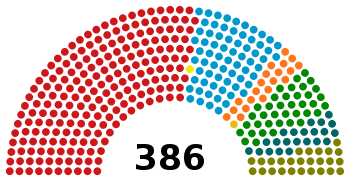 | ||||||||||
| Party | SMCs | MMCs | National seats |
Total seats |
+/– | |||||
|---|---|---|---|---|---|---|---|---|---|---|
| Votes | % | Seats | Votes | % | Seats | |||||
| Hungarian Socialist Party | 1,689,081 | 31.3 | 149 | 1,781,867 | 33.0 | 53 | 7 | 209 | +176 | |
| Alliance of Free Democrats | 1,005,766 | 18.6 | 16 | 1,066,074 | 19.7 | 28 | 25 | 69 | –25 | |
| Hungarian Democratic Forum | 649,966 | 12.0 | 5 | 633,957 | 11.7 | 18 | 15 | 38 | –126 | |
| Independent Smallholders' Party | 425,482 | 7.9 | 1 | 476,416 | 8.8 | 14 | 11 | 26 | –18 | |
| Fidesz | 416,143 | 7.7 | 0 | 379,295 | 7.0 | 7 | 13 | 20 | –2 | |
| Christian Democratic People's Party | 397,887 | 7.4 | 3 | 379,573 | 7.0 | 5 | 14 | 22 | +1 | |
| Workers' Party | 177,458 | 3.3 | 0 | 172,117 | 3.2 | 0 | 0 | 0 | New | |
| Agrarian Alliance | 132,181 | 2.4 | 1 | 113,405 | 2.1 | 0 | 0 | 1 | -1 | |
| Republican Party | 104,289 | 1.9 | 0 | 137,484 | 2.5 | 0 | 0 | 0 | New | |
| Hungarian Justice and Life Party | 67,162 | 1.2 | 0 | 85,623 | 1.6 | 0 | 0 | 0 | New | |
| Liberal Civic Alliance – Entrepreneurs' Party | 42,951 | 0.8 | 1 | 33,367 | 0.6 | 0 | 0 | 1 | New | |
| United Smallholders' Party | 43,234 | 0.8 | 0 | 44,315 | 0.8 | 0 | 0 | 0 | New | |
| Hungarian Social Democratic Party | 32,913 | 0.6 | 0 | 51,122 | 0.9 | 0 | 0 | 0 | 0 | |
| National Democratic Alliance | 32,258 | 0.6 | 0 | 28,075 | 0.5 | 0 | 0 | 0 | New | |
| ASZ–SZDSZ | 9,280 | 0.2 | 0 | – | – | – | 0 | 0 | – | |
| VP–Fidesz–ASZ–SZDSZ | 6,440 | 0.1 | 0 | – | – | – | 0 | 0 | – | |
| Hungarian Market Party | 5,459 | 0.1 | 0 | 635 | 0.0 | 0 | 0 | 0 | New | |
| Conservative Party – Alliance of Farmers and Civilians | 5,241 | 0.1 | 0 | 2,046 | 0.0 | 0 | 0 | 0 | New | |
| Green Party of Hungary | 4,766 | 0.1 | 0 | 8,813 | 0.2 | 0 | 0 | 0 | 0 | |
| SZDSZ–KP | 4,664 | 0.1 | 0 | – | – | – | 0 | 0 | – | |
| Compromise Independent Smallholders' Party | 4,386 | 0.1 | 0 | 5,918 | 0.1 | 0 | 0 | 0 | New | |
| Gypsy Solidarity Party | 3,282 | 0.1 | 0 | – | – | – | 0 | 0 | New | |
| Green Alternative | 2,638 | 0.1 | 0 | 849 | 0.0 | 0 | 0 | 0 | New | |
| Independent Hungarian Democratic Party | 2,366 | 0.0 | 0 | – | – | – | 0 | 0 | 0 | |
| Democratic Coalition Party | 2,117 | 0.0 | 0 | – | – | – | 0 | 0 | New | |
| National Alliance of Hungarian Families | 2,005 | 0.0 | 0 | – | – | – | 0 | 0 | New | |
| Historic Independent Smallholders' Party | 1,792 | 0.0 | 0 | – | – | – | 0 | 0 | New | |
| VP–Fidesz | 1,347 | 0.0 | 0 | – | – | – | 0 | 0 | – | |
| Pensioners' Party | 1,245 | 0.0 | 0 | – | – | – | 0 | 0 | New | |
| Social Democratic Party | 1,197 | 0.0 | 0 | – | – | – | 0 | 0 | New | |
| Democratic Party | 1,150 | 0.0 | 0 | – | – | – | 0 | 0 | New | |
| EKGP–KDNP | 840 | 0.0 | 0 | – | – | – | 0 | 0 | – | |
| Hungarian Socialist Workers' Party | 704 | 0.0 | 0 | – | – | – | 0 | 0 | New | |
| Party of the Hungarian Interest | 416 | 0.0 | 0 | – | – | – | 0 | 0 | New | |
| Union of Hungarian Biomedicists | 334 | 0.0 | 0 | – | – | – | 0 | 0 | New | |
| Hungarian Mothers' National Party | 265 | 0.0 | 0 | – | – | – | 0 | 0 | New | |
| Electoral Coalition for the Hungarians | 211 | 0.0 | 0 | – | – | – | 0 | 0 | New | |
| Party for Historic Hungary | 203 | 0.0 | 0 | – | – | – | 0 | 0 | New | |
| Hungarian Party of the Unemployed | 190 | 0.0 | 0 | – | – | – | 0 | 0 | New | |
| National Forces' Movement | 188 | 0.0 | 0 | – | – | – | 0 | 0 | New | |
| Independents | 122,190 | 2.3 | 0 | – | – | – | – | 0 | –6 | |
| Invalid/blank votes | 78,535 | – | – | 80,198 | – | – | – | – | – | |
| Total | 5,480,222 | 100 | 176 | 5,481,149 | 100 | 125 | 85 | 386 | 0 | |
| Registered voters/turnout | 7,960,293 | 68.9 | – | 7,960,280 | 68.9 | – | – | – | – | |
| Source: Nohlen & Stöver | ||||||||||
References
- Dieter Nohlen & Philip Stöver (2010) Elections in Europe: A data handbook, p899 ISBN 978-3-8329-5609-7
- Nohlen & Stöver, p925
.jpg)

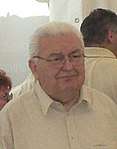
.jpg)
